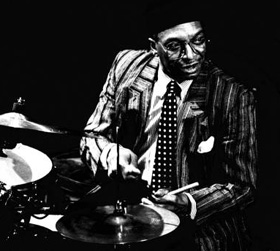
Bobby Durham, a jazz drummer known for his energetic, propulsive style, as well as for the high-flying musical company that he kept, died in Italy on Monday. He was 71, and had been ill with lung cancer and emphysema, a singer who had toured with him in Europe in recent years, Shawnn Monteiro, said.
Durham was practically the only contemporary drummer who worked with Ella Fitzgerald, Duke Ellington, Coleman Hawkins, and, most famously, Oscar Peterson, four legendary bandleaders who were famous the demands they made on their percussionists. Durham was the drummer of choice for nearly all the swing-styled soloists and leaders of the '60s and '70s up to the present day, and he also enjoyed a parallel career working in funky organ combos led by such keyboardists as Charles Earland, Shirley Scott, and Wild Bill Davis.
Born February 3, 1937, Durham was raised in the black music scene of the 1940s and 1950s in Philadelphia, a hotbed of jazz and R&B activity. As a child, he tap-danced and sang in addition to playing drums, and played in several high school bands. By age 16, Durham was touring with the pioneering doo-wop vocal quartet, The Orioles (who apparently recorded their biggest hit, was “Crying In The Chapel," in 1953, with Durham in the rhythm section). For most of the rest of the '50s, he served in the American military (in various service bands) and worked on the R&B circuit.
After his stint in the service, the drummer relocated to New York, at which point he began both gigging and recording with swing and blues-styled instrumentalists. Durham participated in his first jazz record date ("The Burner") in 1963 with blues-based tenor saxophonist Red Holloway, and he served as drummer for the hard-swinging organist Bill Davis. He appeared with Davis on a famous album, taped live in Atlantic City, with Johnny Hodges, Duke Ellington's alto sax player, and this led to a stint with the Ellington Orchestra itself in 1967.
Durham was practically the only contemporary drummer who worked with Ella Fitzgerald, Duke Ellington, Coleman Hawkins, and, most famously, Oscar Peterson, four legendary bandleaders who were famous the demands they made on their percussionists. Durham was the drummer of choice for nearly all the swing-styled soloists and leaders of the '60s and '70s up to the present day, and he also enjoyed a parallel career working in funky organ combos led by such keyboardists as Charles Earland, Shirley Scott, and Wild Bill Davis.
Born February 3, 1937, Durham was raised in the black music scene of the 1940s and 1950s in Philadelphia, a hotbed of jazz and R&B activity. As a child, he tap-danced and sang in addition to playing drums, and played in several high school bands. By age 16, Durham was touring with the pioneering doo-wop vocal quartet, The Orioles (who apparently recorded their biggest hit, was “Crying In The Chapel," in 1953, with Durham in the rhythm section). For most of the rest of the '50s, he served in the American military (in various service bands) and worked on the R&B circuit.
After his stint in the service, the drummer relocated to New York, at which point he began both gigging and recording with swing and blues-styled instrumentalists. Durham participated in his first jazz record date ("The Burner") in 1963 with blues-based tenor saxophonist Red Holloway, and he served as drummer for the hard-swinging organist Bill Davis. He appeared with Davis on a famous album, taped live in Atlantic City, with Johnny Hodges, Duke Ellington's alto sax player, and this led to a stint with the Ellington Orchestra itself in 1967.
For more information contact All About Jazz.



























